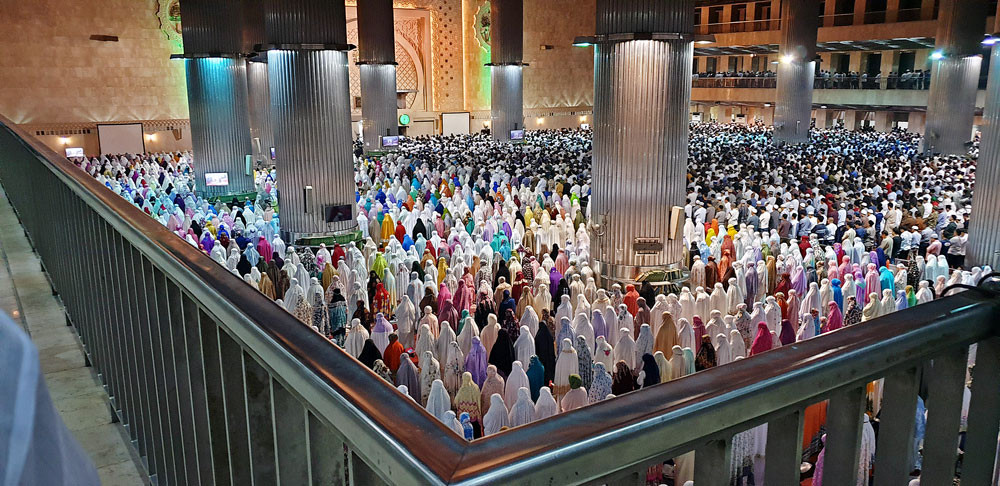Popular Reads
Top Results
Can't find what you're looking for?
View all search resultsPopular Reads
Top Results
Can't find what you're looking for?
View all search resultsCOVID-19: Groups call on Muslims to pray at home
Social distancing during Ramadan a challenge for Muslim-majority Indonesia.
Change text size
Gift Premium Articles
to Anyone
N
ahdlatul Ulama (NU) and Muhammadiyah, the nation’s largest Islamic organizations, have called on Indonesian Muslims to observe the fasting month of Ramadan at home to contain the spread of the COVID-19, which has shown no sign of abating.
During Ramadan, which begins on Friday, Muslims refrain from eating, drinking and partaking in other corporeal pleasures from dawn till dusk. But Ramadan represents much more than just fasting for Muslims worldwide, including in Indonesia.
It is the largest and longest religious observance of the faith professed by more than 80 percent of the country’s population and is a time for many communal activities, including tarawih (mass night prayers), bukber (iftar group meals) with families and colleagues, sahur (predawn meals) on the street, as well as family visits to the graves of relatives.
However, Muslims have been instructed to forgo these traditions to flatten the curve of COVID-19 contagion. As of Wednesday evening, the country had confirmed 7,418 cases of the virus and 635 deaths. With Greater Jakarta under partial lockdown, Muslims in the area have been ordered to stay home and have been prohibited from taking part in activities involving more than five people, including prayers.
Read also: NU, Muhammadiyah advise public to skip 'mudik’ in time of coronavirus
On Wednesday, Jakarta Governor Anies Baswedan announced that he would extend the partial lockdown, which was supposed to end on Thursday, until May 22.
To ensure that Muslims follow the rules, NU and Muhammadiyah have issued religious fatwas advising them to refrain from performing mass prayers.
“[At-home prayer] is an endeavor that is justified by Islamic and scientific considerations to prevent the spread of an outbreak. Do not think that we are under normal conditions. The fact is that this is an emergency situation,” Muhammadiyah chairman Haedar Nasir said in a written statement on Wednesday. “During this global emergency situation, do not observe your religion based on your own free will.”
NU executive Robikin Emhas echoed a similar sentiment, saying that “breaking the chain” of COVID-19 infection should be a collective effort. “Certain types of worship commonly performed in mosques should be done at home or in accordance with health procedures established by the government or local authorities,” he said.
The call to prayer, he added, could still be recited and broadcast from mosques, but it was meant only to announce the time of prayer and should not be taken as encouragement to go to mosques.
Islamic groups have launched intensive campaigns urging Muslims living in COVID-19 red zones to suspend mass prayers. Muhammadiyah, for instance, promoted the hashtag #RamadandiRumah (Ramadan at home) on Wednesday to encourage Muslims to worship at home.
The Religious Affairs Ministry has issued a letter outlining prayer and worship guidelines for Muslims during this year’s Ramadan to “protect Muslims in Indonesia from the risk of contracting the disease”. The letter instructs Indonesian Muslims to perform tarawih and tadarus (Quran recitations) at home and not to participate in bukber or sahur gatherings in public. The nuzulul quran (Quran revelation day) commemoration, which usually takes place in mosques, will also be canceled.
It is unclear, however, if all Muslims, particularly in areas where partial lockdowns are not officially in place, will follow the fatwas or the instructions issued by the ministry, which are directed at all Muslims in Indonesia.
The Aceh Ulema Council (MPU), for instance, has announced that it will allow people to perform daily mass prayers and tarawih despite the outbreak. MPU deputy chairman Faisal Ali defended the decision, saying the council was only allowing mass prayers in areas where the spread of COVID-19 was contained.
“People who live in areas where COVID-19 is under control may perform daily prayers, as well as tarawih and Idul Fitri prayers at mosques while limiting their durations,” Faisal said on Tuesday as quoted by tribunnews.com. He said people residing in red zones should not perform group prayers.
Read also: Religion and COVID-19 mitigation
Critics have questioned Indonesia’s ability to reliably detect clusters of the virus and determine red zones with such limited testing capacity. As of Wednesday, Indonesia had tested 184 people per 1 million, a testing rate significantly lower than that of many other countries.
A village in Magetan, East Java—home to Al Fatah Pesantren (Islamic boarding school) and its more than 20,000 santri (Islamic boarding school students)—is currently under quarantine after 43 of its santri tested positive for COVID-19 in Malaysia. The incident has shocked many as East Java Governor Khofifah Indar Parawansa had recently praised Magetan for its successful efforts to contain the virus.
As thousands of people have already left Greater Jakarta, the epicenter of the country’s COVID-19 outbreak, to celebrate Idul Fitri in their hometowns, the country — in the absence of widespread testing — is depending on voluntary social distancing to contain the spread of the disease.










